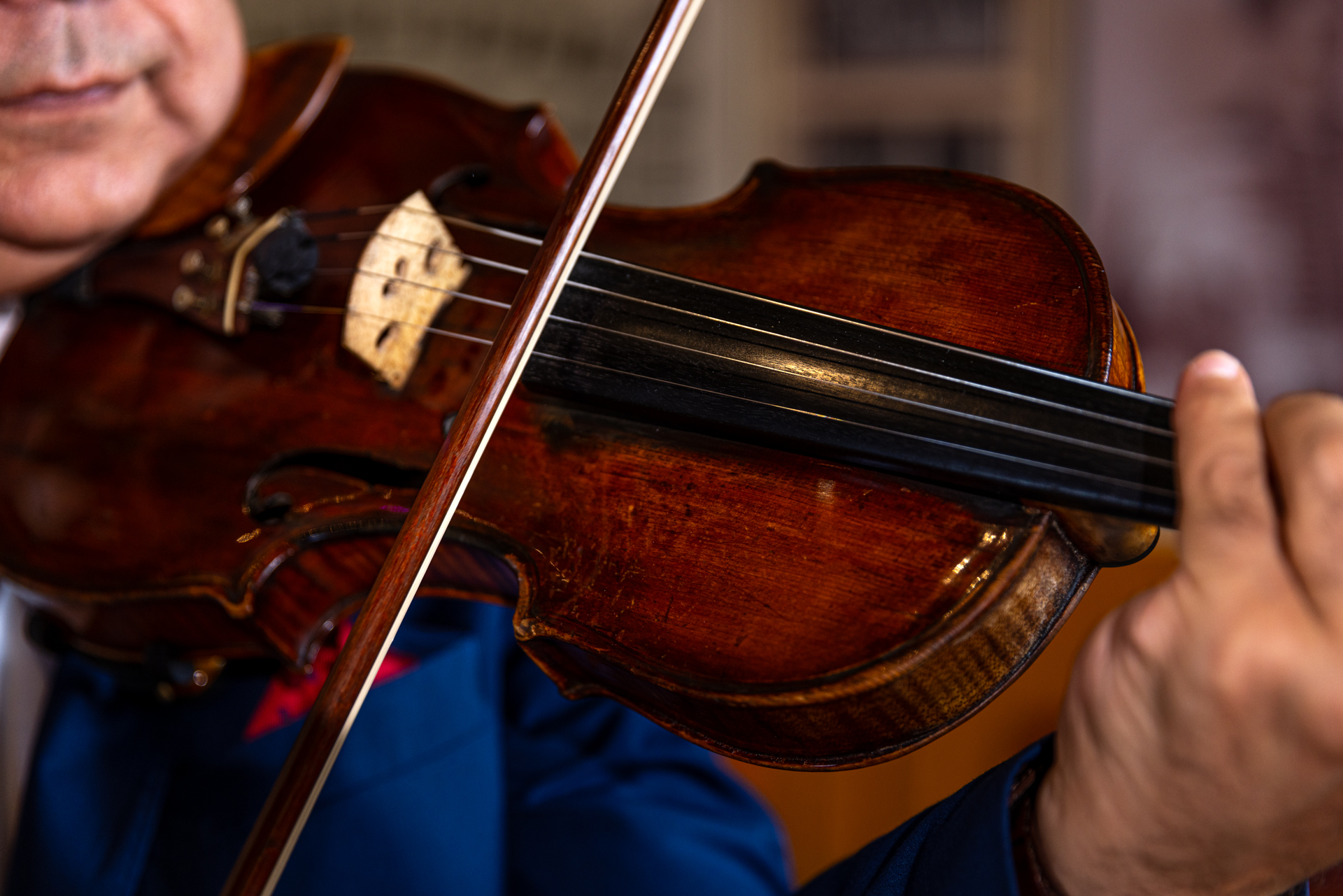Japánban és Hollandiában is tanítanak a magyar cigányzenészek
There are Hungarian Romani musicians teaching in Japan and the Netherlands

Óriási kultusza van külföldön a magyar cigányzenének: nemcsak hallgatni, játszani is szeretik, és magyar mestereket hívnak, hogy a legjobbaktól tanulhassanak.
Meglepő, de ma is előfordul, hogy valaki megbíz azzal egy cigányprímást, hogy a temetésén legyen ott, húzza el a kedvenc nótáit – és előre ki is fizeti a gázsiját. Aki „nótázós” családban nőtt fel, esküvőre, születésnapra, keresztelőre ugyanúgy cigányzenekart szerződtet, mint száz évvel ezelőtt – és nem DJ-t hív.
Az talán még meglepőbb, milyen keresett nemzetközi területeken a hazai cigányzene!
A SZÍV ÉS A LÉLEK ZENÉJÉT MINDEN NYELVEN ÉRTIK
Hollandia évtizedek óta az az ország, ahol folyamatosan alakulnak és autodidakta módon képzik magukat a (nem feltétlenül magyar származású tagokból álló) helyi cigányzenekarok. A hollandok nagyon kedvelik a magyar nótákat, a csárdást, és folyamatosan hazai muzsikusokat hívnak ki, hogy tőlük tanulják a mesterség fortélyait. A hungarikumnak számító cigányzene népszerűsítéséért 2013-ban alapítványt is létrehoztak. A Magyar Nóta Alapítvány célja, hogy szélesebb körben megszerettesse a cigányzenét, támogassa ennek az egyedi műfajnak a fennmaradását, és segítse a cigánymuzsikusokat.
Norvégiában ugyancsak működik cigányzenekar, de Japánban, Belgiumban, Német- és Oroszországban hivatásos, illetve amatőr zenészek ugyancsak tanulnak magyar cigányzenét, sőt bandákat is alakítanak.
A MUZSIKUSOK VISZIK A CIGÁNYZENE HÍRÉT
Míg itthon egyre kevesebb étteremből szűrődik ki cigányzene, addig az északi országok egyre mélyebb szeretettel és komoly érdeklődéssel fordulnak a műfaj felé. Harminc-negyven éve Budapest utcáin nem lehetett úgy végigmenni, hogy a szórakozóhelyekről ne cigányzenekarok muzsikája szűrődjön ki. A tanuló zenészek is járták a szállodákat, éttermeket, és egy-másfél órára egy üdítő mellett beültek hallgatni a „nagyokat” – id. Oláh Kálmánt, Hankó Farkas Ferencet vagy Lakatos Miklóst az EMKE kávéházba. Ahogy egy híres prímás fogalmazott: „tanulni minden zenésztől lehet – ha jó, azért, ha rossz, akkor meg azért”. A zenészek általában kiszúrták a fiatalokat, akik többnyire a legendás Rajkó Zenekar kollégistáiként tanultak Budapesten. Megszólították, megvacsoráztatták őket (tudták, hogy a kollégiumban nem a legjobb a koszt), és meg is muzsikáltatták, hogy lássák, hol tart az ifjúság. Ezek az ifjak felnőve bejárták a világot, vitték a magyar cigányzene hírét, és mesterkurzusokat is tartottak, tartanak nemzetközi hírű zenészeknek.
ENGLISH VERSION
Hungarian Romani music has a significant following in other countries: people not only listen to it but also play it, and they invite authentic Hungarian musicians so they can learn from the best.
Surprisingly even today people ask Romani band leaders to come to their funerals and play their favourite songs, paying them in advance of course! People who grew up listening to nótas with their families often hire Romani bands instead of a DJ for their weddings, birthdays and christenings just as they did a hundred years ago.
It is rather surprising how popular Hungarian Romani music is internationally.
THE MUSIC OF THE HEART AND SOUL CAN BE UNDERSTOOD IN EVERY LANGUAGE
There have been local self-taught Romani bands (which don’t necessarily have any Hungarian members) in the Netherlands for decades. The Dutch are very fond of Hungarian nótas and the csárdás, and they regularly invite Hungarian musicians so they can learn the tricks of the trade from them. In 2013 a foundation was created to popularise Romani music, which is considered a Hungarikum. The goal of the Hungarian Nóta Foundation is to promote Romani music to a wider audience, to support the survival of this unique genre and to help Romani musicians.
There is also a Romani band in Norway, and there are professional and amateur musicians who have studied Hungarian Romani music and set up bands in Japan, Belgium, Germany and Russia.
MUSICIANS SPREAD THE WORD ABOUT ROMANI MUSIC
While fewer and fewer restaurants have live Romani music in Hungary, Nordic countries are turning to this genre with deepening love and serious interest. Thirty or forty years ago it was impossible to walk through the streets of Budapest without hearing the music of Romani bands wafting from restaurants. Music students would go to hotels and restaurants, sit down for a while for a drink and listen to the greats – Kálmán Oláh senior, Ferenc Hankó Farkas or Miklós Lakatos in the EMKE café. A famous band leader once said: „you can learn from every musician – whether they play well or badly”. The musicians usually spotted the young people, who mostly studied with Budapest’s legendary Rajkó Orchestra. They invited them to dinner (they knew that food wasn’t great in the dorms), and also asked them to play to see how much they had developed. These youngsters grew up, travelled the world, spread the word about Hungarian Romani music and gave (and still give) masterclasses to internationally renowned musicians.